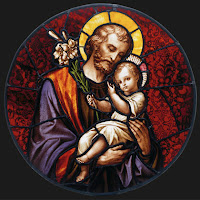PRAISED BE JESUS, MARY, AND
JOSEPH!
 |
| The Sanctuary at Passiontide |
The sanctuary looks gloomier
today on account of the veiling of the crucifixes and sacred images. Once more
we are reminded of the proximity of Holy Week. In the old calendar, we used to
say that we have entered Passiontide. This means that we begin commemorating
the sufferings of our Savior. Therefore, we mourn over his suffering and death.
We also mourn for our sins which brought him to suffering.
But for our Lord, the approach of
the days of his suffering is not an occasion for sadness. He said: “The hour
has come for the Son of Man to be glorified.” What to the world seem to be days
of pain and sorrow, to the Lord, these are days of glory. Again, the Lord
upsets the thinking of the world. “Glory” means honor, public praise, and fame.
Thus, to the world, it would mean popularity and public adulation. But to the
Lord, it would mean humiliation and suffering. In other words, the glory of
Christ is the Cross.
 The Cross is the glory of Christ.
It is the way by which he glorifies the Father. it is the way by which he is
glorified by the Father. “Son though he was, he learned obedience by what he
suffered; and when he was made perfect, he became the source of eternal
salvation for all who obey him.” The Son of God glorified his Father by
obediently accepting even death, death on the Cross. Every living being values
its survival. But when the Lord obeyed
his Father unto death, he gave greater importance to his Father than to his own
life. He surrendered his will to the will of his Father. He offered his life
because he loves the Father. In this way, his death becomes lifegiving. Losing
his life, Jesus gave life to the world. He is the grain of wheat that falls to
the earth and dies in order to bear much fruit. And he challenges us to imitate
him: “Whoever loves his life loses it, and whoever hates his life in this world
preserves it for eternal life.” St. Teresa of Jesus takes the image of the worm
which weaves a cocoon of silk around itself. In this cocoon, the worm dies in
order to be transformed into a butterfly. So it is which anyone whose life is
hidden in Christ. He dies to his own will and in doing so, he conforms himself
to the will of God. He dies to his own self and in doing so, he is transformed
into the likeness of Jesus. “Whoever serves me must follow me, and where I am,
there also will my Father be. The Fath
The Cross is the glory of Christ.
It is the way by which he glorifies the Father. it is the way by which he is
glorified by the Father. “Son though he was, he learned obedience by what he
suffered; and when he was made perfect, he became the source of eternal
salvation for all who obey him.” The Son of God glorified his Father by
obediently accepting even death, death on the Cross. Every living being values
its survival. But when the Lord obeyed
his Father unto death, he gave greater importance to his Father than to his own
life. He surrendered his will to the will of his Father. He offered his life
because he loves the Father. In this way, his death becomes lifegiving. Losing
his life, Jesus gave life to the world. He is the grain of wheat that falls to
the earth and dies in order to bear much fruit. And he challenges us to imitate
him: “Whoever loves his life loses it, and whoever hates his life in this world
preserves it for eternal life.” St. Teresa of Jesus takes the image of the worm
which weaves a cocoon of silk around itself. In this cocoon, the worm dies in
order to be transformed into a butterfly. So it is which anyone whose life is
hidden in Christ. He dies to his own will and in doing so, he conforms himself
to the will of God. He dies to his own self and in doing so, he is transformed
into the likeness of Jesus. “Whoever serves me must follow me, and where I am,
there also will my Father be. The Fath
The Father honored Jesus by
declaring that he is well pleased with the Son whom he loves. Because Jesus
humbled himself and obediently accepted death on the Cross, God highly exalted
him and gave him a Name which is above all other names. He draws all people to
his Son who was lifted up on the wood of the Cross. If we are to follow Jesus, we are to follow
him along the same way of the Cross. If we are to serve him, we will serve him
by our self denial. “Therefore, take courage,” says St. Teresa, “Let us…weave
this little cocoon by getting rid of our self-love and self-will, our
attachment to any earthly thing, and by performing deeds of penance, prayer,
mortification, obedience…Let it die; let this silkworm die…And you will see how
we see God, as well as ourselves placed in his greatness, as is this little
silkworm within its cocoon…When the soul is truly dead to the world, a little
white butterfly comes forth.” Jesus was made perfect by what he suffered. In
like manner shall we be transformed if we deny ourselves, take up our cross and
follow him.
Jesus, I trust in you. O Mary
conceived without sin, pray for us who have recourse to thee!












